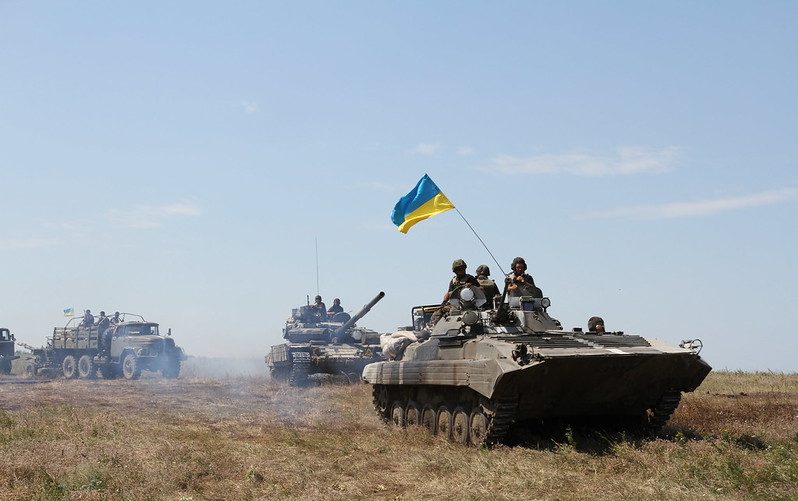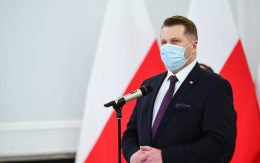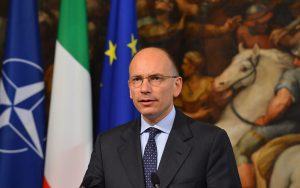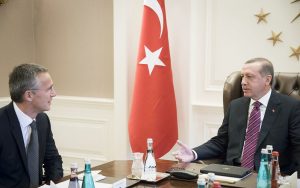In the midst of the escalation of tensions between Russia and Ukraine, Joe Biden follows the policy of Obama’s presidency, which had underestimated the Russian threat.
The first major test of the Biden presidency constitutes the diplomatic crisis sparked by Russian troop movements near Ukraine’s eastern border and, simultaneously, in Crimea. In charge of the Ukrainian case in his previous role as vice president during Obama’s presidency, Joe Biden, underestimated the Russian threat and outsourced the role of the mediator to Germany?
Joe Biden is the first US president since the end of the Cold War to come into office without the illusion of conciliation with Moscow. While the political settlement of the conflict has not advanced since the 2015 Minsk accords and in response to the Ukrainian president’s urgent calls for stronger American involvement, Washington is reassuming its role as “Europe’s policeman”. Besides, this situation is aggravated by the recent Ukraine’s request to join NATO.
Transatlantic cooperation
This escalation of tensions with Russia is also a test for a geopolitical Europe and in particular for Germany. Coupled with the American sanctions and the opposition of a growing number of European countries to the Nord Stream 2 gas pipeline project, the situation in Ukraine strongly calls for transatlantic cooperation.
The inauguration of Joe Biden is a game-changer for Ukraine, which relies on the United States and NATO to deter Russia from threatening its security and territorial integrity. The escalation of Russian diplomatic and military pressure on Ukraine can be explained partially by Kyiv’s rapprochement with the Biden administration, which has clearly shown its support for Ukraine and its willingness to re-engage in NATO. Thus, the posting of an additional 500 US servicemen in Germany is a manifestation of the US reinvestment in Europe.
Biden is also stepping up US military mobilization in the Black Sea and Eastern Europe and continuing the delivery of lethal defensive weapons to Kyiv, authorized by Trump in 2017. In early March, the Pentagon announced an additional military aid of 125 million dollars (105 million euro) to Ukraine, including two armed patrol boats intended for the defense of the territorial waters of the country.
Putin’s red lines
Putin recalls his red lines: reopening talks on Ukraine’s integration into NATO and strengthening the US and NATO military presence in the region. Washington has also not publicly supported Kyiv’s call for faster NATO membership. The country’s first application for membership was made in 2008, at the Bucharest summit. In addition, NATO did not grant candidate status to Ukraine at the time, but Alliance members announced that Ukraine would one day become a member, without setting a deadline. Indeed, some countries, including France and Germany, feared they might become involved in a conflict with Russia if tensions with Ukraine escalated. Previously with regard to Georgia, Putin did not accept crossing this red line, seen as too threatening to Russian interests, and decided to invade the country.
This unease around the NATO issue is symptomatic of a broader failure of the United States – and its European allies – to define a strategy for Ukraine and to end the war of attrition that Russia is waging to control the country. The United States missed two opportunities to ensure the security of Ukraine: by failing to offer Kyiv solid guarantees of territorial integrity under the Budapest memorandum in 1994 and by favoring the enlargement of NATO to the detriment of the more open Partnership for Peace. This uncertain status of Ukraine, which is neither a member of the European Union (EU) nor a member of NATO, has had the effect of transforming the country into a buffer zone, devoid of reliable allies and therefore open to Russian interference.
Germany and France have attempted to act as intermediaries between Washington, Moscow, and Kyiv, but their efforts have resulted in prolonging the political status quo – that is, the maintenance of a frozen conflict that holds the NATO and the EU at a distance from Ukraine, serving the interests of the Kremlin.
Strengthening ties between Washington and Kyiv
For Biden, the best option is to strengthen bilateral political and military ties between Washington and Kyiv, working closely with his European allies. The concomitant visit of US Secretary of State Antony Blinken and Defense Secretary Lloyd Austin to Brussels this week puts pressure on Europeans for a coordinated approach with Washington on Russia, including on sanctions and strengthening their contributions to NATO’s defense and deterrence posture in the east and in the Black Sea.
In June 2014, Barack Obama set up the European Reassurance Initiative, which strengthened the US military presence in Eastern Europe, the Black Sea, and the Baltic Sea, but he also called on his European allies to increase their military spending. Today, aside from the nuclear arms limitation agreement, the bilateral agenda for US-Russian relations has shrunk. But Biden, like his European allies, does not wish to break with Moscow, which has become an indispensable interlocutor in all theaters where the United States and the EU have strategic interests.
Similarly to other fronts (Syria, Libya, Eastern Mediterranean, and the Caucasus) where Western diplomacy has broken down, we are witnessing a growing influence from Turkey. More precisely, Ankara is equipping the Ukrainian army with combat drones that could be used in a confrontation with Russia and pleads for a stronger NATO presence in the Black Sea, considering Ukraine as a crucial buffer zone vis-à-vis Russia. Spheres of influence are confirmed and competing in Europe and Asia, where China is increasing pressure on Taiwan, the Philippines, and the South China Sea. Above all, this logic of spheres of influence will shape geopolitical competition in the decades to come and will be a major factor of instability that will be difficult to counter.
Sources https://apnews.com/article/joe-biden-politics-ukraine-vladimir-putin-russia-3a29fb722f9725314495dbaf90b32252 https://www.bbc.com/news/world-europe-56746144 https://www.bbc.com/news/world-europe-56746138 https://www.theguardian.com/us-news/2021/apr/13/ukraine-russia-joe-biden-vladimir-putin-phone-call








Be First to Comment